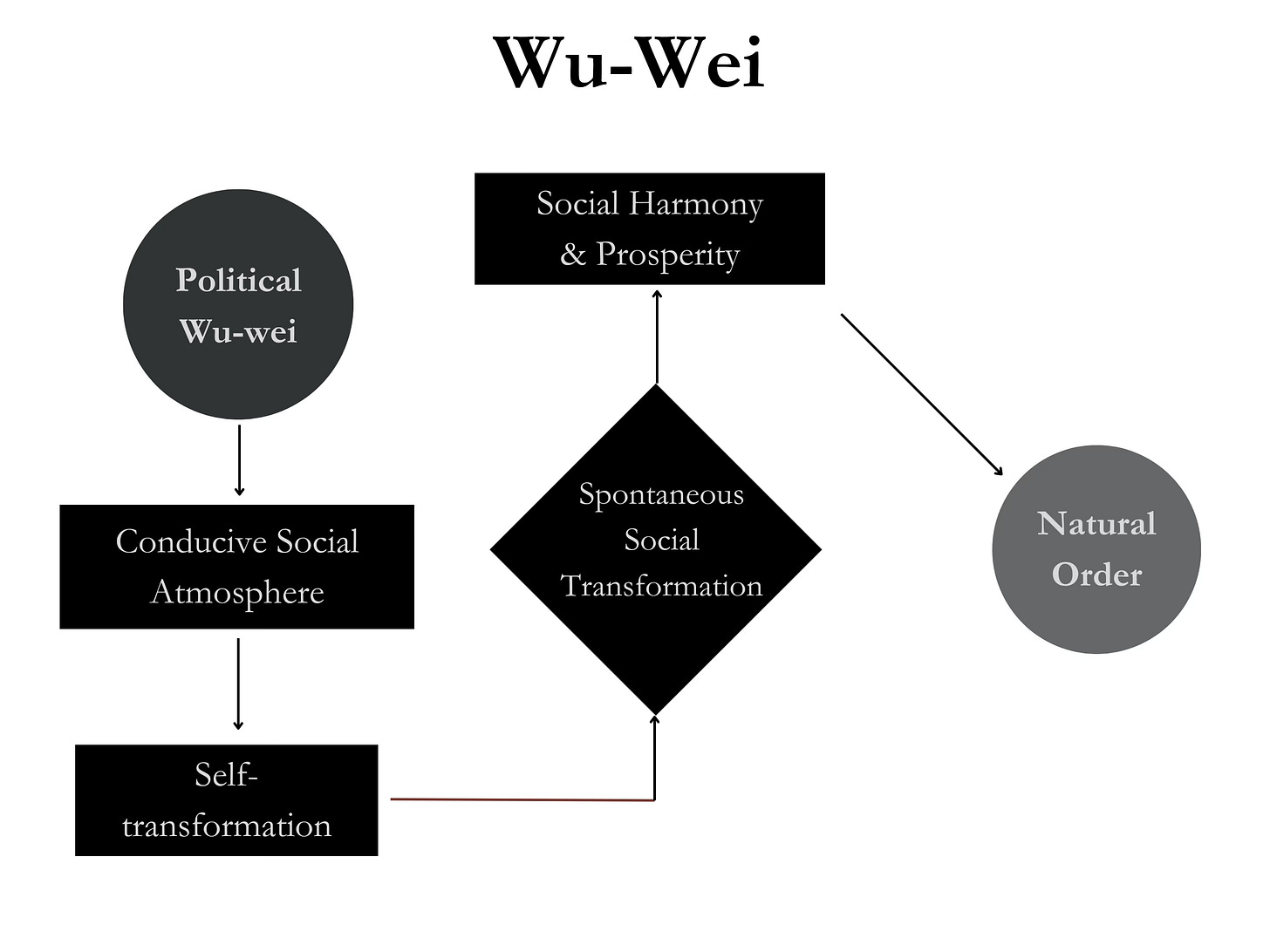#46 2 Powerful Principles from Lao Tzu to Navigate Crises
Tao Te Ching, Chapter 46: Awakening the leader within: Take full responsibility for self-fulfillment and embrace contentment to go through life’s uncertainties.
Welcome back to The Wisdom of Lao Tzu.
This week, we're delving into Chapter 46 of the Tao Te Ching, a profound contemplation on society’s perpetual cycle of peacetime and wartime.
As we navigate the complexities of existence, are we conditioned to accept this recurring cycle? Are we prepared for unforeseen crises that may disrupt our lives?
Let’s seek some answers from Lao Tzu.
**46**
天下有道,卻走馬以糞。
天下無道,戎馬生於郊。
禍莫大於不知足;
咎莫大於欲得。
故知足之足,常足矣。
Border-crossing: English translations
#1 Lin Yutang’s version
When the world lives in accord with Tao,
Racing horses are turned back to haul refuse carts.
When the world lives not in accord with Tao,
Cavalry abounds in the countryside.
There is no greater curse than the lack of contentment.
No greater sin than the desire for possession.
Therefore he who is contented with contentment shall be always content.
#2 Edmund Ryden’s version
When the world has the Way, trotting horses are used for their dung;
When the world lacks the Way, war-horses are born on temple mounds.
(There is no graver crime than wanting too much;)
There is no bigger disaster than not knowing what is enough;
There is no greater misfortune than wanting to get.
Therefore,
To know that enough is enough, this is ever to have enough.1
#3 D. C. Lau’s version
When the way prevails in the empire, fleet-footed horses
are relegated to ploughing the fields; when the way does
not prevail in the empire, war-horses breed on the border.
There is no crime greater than having too many
desires;
There is no disaster greater than not being content;
There is no misfortune greater than being covetous.
Hence in being content, one will always have enough.2
Deeper dive
Throughout human history, the evolution between wartime and peacetime has been a recurring theme.
In wartime, the Tao, or the natural order of things, is lost in the human realm. So we see a world fraught with constant conflict, suffering, and loss. Rulers, driven by unchecked desires and a lack of contentment, wield power arbitrarily, often at the expense of their people. As a result, countries fall into political turmoil and military adventurism.
Conversely, peacetime signals an era of harmony and cooperation among countries. People are generally content with their respective positions within a functioning system.
The concept of contentment emerges as a pivotal factor in discerning between these two realities. War and conflicts, it can be argued, stem from a fundamental failure to appreciate the virtue of contentment.
Aggressive rulers, driven by insatiable desires, cloak their ambitions in political rhetoric and propaganda. And they justify their actions as necessary for national glory or security.
In contrast, morally upright and capable leaders recognize the importance of creating an environment conducive to individual self-development and empowerment. They understand that social transformation relies on the inner cultivation of the populace instead of external coercion.
This is aligned with Lao Tzu’s teaching, “Hence the sage says, I take no action and the people are transformed of themselves.” (Chapter 57)
In such a context, political wu-wei restrains rulers’ impulses and arbitrary actions. In Lao Tzu’s political thinking, the purpose of wu-wei is to allow ordinary people the space to self-transform within a minimal political order.
Attaining lasting peace also hinges upon the enlightened leadership's appreciation of contentment and commitment to nurturing a domestic environment conducive to human flourishing.
Wang Bi's (226 - 249 AD) commentary on the statement, "When the way prevails in the empire, fleet-footed horses are relegated to ploughing the fields," underscores the importance of aligning with the natural order of things.
He said, “The way of heaven is to be content and know when to stop, not to seek from outside oneself. Each should cultivate oneself within.”3
In other words, true political achievements can be found in cultivating inner contentment and social harmony rather than external conquests.
The interplay between war and peacetime is a reminder of humanity's perennial struggle to balance ambition with contentment.
Spiritual Taoism
In the turbulent ebb and flow of human history, the pendulum swings between periods of stability and upheaval. Thus, it is obvious that proactive preparation is essential for weathering the storms ahead.
With this understanding, we can rely on two fundamental principles:
taking responsibility for our well-being, liberty, and fulfillment
embracing the value of contentment
Individual Responsibility
The first principle advocates for a proactive approach to life.
Individual responsibility requires a deep awakening. No external entity, be it government or social entities, can guarantee our safety and prosperity.
In other words, being responsible for all aspects of our lives is to assert individual sovereignty and self-reliance.
The character of our society is a reflection of the collective characteristics of its people. Thus, it is our priority to be committed to self-transformation and self-establishment.
It is essential that we establish order and structure in daily life. They will serve as the bedrock for a productive and meaningful existence.
Embracing contentment
Lao Tzu considers contentment as a guiding principle for navigating the complexities of life. In his words, “There is no greater curse than the lack of contentment.”
Contentment is not mere complacency but a state of inner peace that shields one from disaster and misfortune.
Fostering contentment can help us resist the temptations of overreach and contention. This, in turn, helps us cultivate a mindset of openness and receptivity to possibilities and opportunities.
Moreover, contentment leads to self-control. It enables us to navigate life's vicissitudes with equanimity and grace.
Several steps can be employed to operationalize these principles.
First, we must determine our priorities in life and steadfastly adhere to them. It is crucial to grasp what truly matters. Then, we can allocate time and resources judiciously, minimizing distractions and extraneous pursuits.
Secondly, we need to sever unnecessary entanglements and attachments that weigh us down. The journey toward self-fulfillment is paved by cutting unnecessary and disruptive entanglements.
Finally, we must assess our behaviors and actions, curtailing recklessness and arbitrariness. Staying mindful can help us make informed decisions that align with our values and aspirations.
Through building effective life systems, we can fortify ourselves against future uncertainties. In doing so, we not only safeguard our own welfare but also contribute to the cultivation of a resilient and flourishing society.
Thanks for reading!
Wishing you wisdom and freedom,
Yuxuan
Daodejing, trans. Edmund Ryden. (Oxford: Oxford University Press, 2008), 97.
Tao Te Ching, trans. D. C. Lau. (London: Penguin Classics, 1963), 53.
「天下有道,知足知止,無求於外,各修其內而已。」See Wang Bi et al., Four Kinds of Laotse 老子四種 (Taipei: National Taiwan University Press, 2016), 40.






